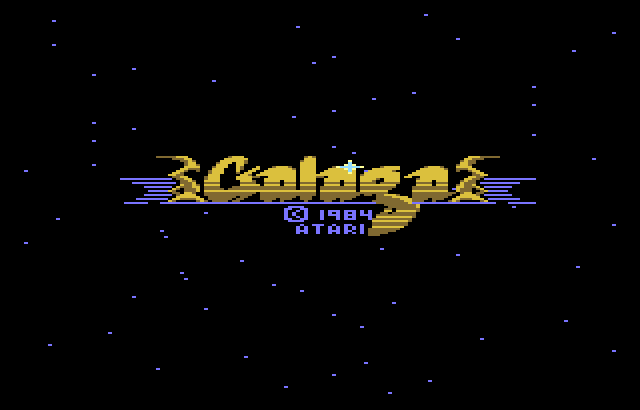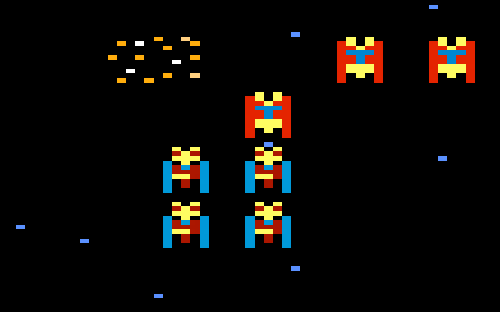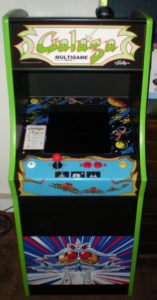Retrogamer: Threshold
Michael B. Tager
We meet at a nearby alternative bookstore, Atomic Books, to play the multicade in their bar (all bookstores should have bars, if you ask me). I’m often in a shirt and tie, coming straight from work. Michael Kimball, my most-regular companion and unofficial instructor, is more comfortably attired in jeans and V-necks. (he also wrote the definitive book on Galaga, titled, appropriately enough, Galaga) doing his damnedest to teach me the finer points. I listen when he talks about movement and memorization, about how to anticipate the alien spacecrafts’ dives toward my lone fighter. Crucially, he instructs me in the Challenging Stages, harmless levels that break up the deadly action and serve to garner high scores. I try to implement his suggestions. Success is limited.
My first game went surprisingly well, especially considering it had been maybe five years since I’ve played Galaga. The game was faster than my Galaga-mentor expected; evidently, the system we used using—an emulator “Multicade” with dozens of other classics like 1943, Centipede, and Burger Time, among others—is calibrated at a higher speed than normal. But regardless of the speed, I made it to the tenth or eleventh round and when my final ship burst into pixels, my score sat at 78,000. Just good enough to crack the top five.
“Pretty great,” Kimball said, clapping my shoulder. He’s a tall man and his hand, heavy and warm, was encouraging. I moved aside as he inserted a new quarter and, with deftness from decades of practice, proceeded to rack up nearly two hundred thousand points, burying me out of the leaderboard and making the top two. He deflected praise and instead pointed at the top name. “She’s really good.” He recognized her from other machines across the city and I realized that Kimball is part of a quiet community.
When I played again, my game nosedived to 60,000. Barely 50,000 after that. Then a game where I lost a life in the first level because of concentration lapse. Finally, by the last game, I’m under 40,000 and my cool is lost.
“Don’t worry about it,” Kimball said as I, frustrated, allowed pixel-aliens to destroy me without fighting back. “I’ve had games like that.” He played again and then we switch to Phoenix and Burger Time. I enjoyed Burger Time. That shit is weird. Before we left, I played one last game of Galaga, my score unremarkable, but an improvement over the last debacle.

Galaga is a simple game: a finite number of enemy ships swoop into the stage from the top and the sides, firing at the player. Among the weak enemy ships, there are “Boss Galaga”: stronger ships that take two hits before exploding. The bosses, in addition to dives, also steal the player’s ship with a tractor beam. Once the ship is captured, it is hidden behind the Boss and the player. By destroying the boss, players can free the ship and use it at the same time for double fighters. “Some people,” Michael said, as he allowed his fighter to be taken, “prefer to only use one. You can play however you like.” I’ve always preferred double-fighters.
When the enemies in each stage are destroyed, the subsequent stage begins. The enemies (they resemble bugs) attach in similar ways, swooping into the screen, but each stage moves incrementally faster, with slightly more enemies that attack a little bit frequently. Every stage is harder than the last. Eventually the enemies flash and swoop across the screen swifter than I can possibly track, their weapons a storm of space-bullets. There are those good enough—either at memorization or their reflexes—to endure past the lightning speed to make it to level 255. I am not one of them.
Over the next few months, Kimball and I met several times, taking turns and shooting the shit, in between earnest attempts at my improvement. “Hide in the corners,” he might say in an early stage, “even with, it’s generally safe.” My average scores improve each session. I enjoy myself, of course, but I always come to an enjoyment threshold, beyond which I cannot pass. When our schedules don’t align, I don’t manage to make it alone to play. Something always comes up. Much like exercise, it’s easier on the buddy system.
“Put your fighter here,” he said, guiding my fighter to a point just to the right of center screen. He’s soft spoken, but confident. “It’s easier to hit them all on the way down, rather than when they start flying across the screen.” This is not his first rodeo. I follow his directions and press the fire button as fast as I can. I destroy all but one, failing to get the maximum bonus. “You’ll get there.”
He’s right, I knew that. I could get there. But as we continue, I realize there’s a conundrum that, despite my rising competitive streak and despite my genuine enjoyment, keeps me from going all in. I’m having fun, but only on the tactile, reflex-level. On a deeper level, I cannot engage with Galaga.
Unlike many of the recent games I’ve played, such as Valkyria Chronicles or the original Fallout, I’m never “there” with Galaga. There’s no sinew that connects the game to blood and bone. There’s no story to immerse in, no characters to empathize with. It’s just an endless stream of enemies that move faster and faster until I can no longer keep up. What’s there to connect with? It’s not Galaga‘s fault, of course. It came out in 1981, a sequel to Galaxian. Games were primitive back then, and had little space for commodities like story. Kimball has been playing since Galaxian.
Now, I’m sure other players have engaged with Galaga. I’m sure they’ve written fan fiction or have imagined themselves in the role of the starfighter (a la The Last Starfighter) Perhaps someone has sexualized the Boss Fighters that tractor beam the player ships and hide them behind enemy lines—in fact, according to the rule 34 of the internet, “If it exists, there is porn of it. No exceptions.”
I will not google Galaga-porn.
Instead of the truly immersive experience that games have aspired to for the past few decades, Galaga is really just a game, no different than any other that rewards dexterity and reflexes. It’s like pickup basketball, in a way. I surely enjoy being on the blacktop and working up a sweat, but I don’t dream about it when I’m not there.
Playing with Kimball and others who dropped in over the past few months illustrated a happening that I’ve encountered more and more often the older I’ve gotten. Kimball is a master at Galaga; he’s been playing since the early 80s and grew up with it. “The first time the spaceships attacked from the bottom was a shock,” he said. “We’d never seen anything like it before.” I understood what he meant; I remembered the first time I played FF3 and the bad guy blew up the world. That was some shit.
I played Galaga here and there over the decades and have a general level of facility with video games—I’m not bad by any means, but I’m no pro. The others that drop in? There were tens of thousands of points between Kimball and myself and more tens of thousands between me and the rest. It’s disparity.
I run into this same problem whenever I play chess or get into a swimming pool. I’ve been playing chess since 1985. I started swimming competitively in 1990. I’m better than the vast majority of the population. It’s just the way it is. I’m no savant, but I have a certain advantage.
Of course, I never progressed past “being just good.” I found other interests, I realized the height of my natural gifts, I started smoking pot; there are a thousand reasons. But with activities like chess and swimming, it’s hard to find a fair match. Either I’m much better or I’m much worse. The sweet spot of “good, not great” is weirdly hard to find.
Competition, after a certain point, is hard to match up. And sans competition, enthusiasm only goes so far. I’m sure there’s plenty of folks who want to complete level 255 and crash the system, but I’m not one of them. Nor do I think that my reflexes can be honed to that point. No, for me, the point of the game is to beat the high score that’s on the multicade. If I can’t do that, I just want to beat my own high score.

In so many games, this is all I aspire to: beat myself and the next best person. Kimball is not the next best person in Galaga; he’s too many rungs up. I’m not sure where that person is. Maybe there is no such person. I know I never found that person playing Minesweeper.
From 2002 until whenever it stopped coming equipped on all PCs, I turned on Minesweeper and ran the table when I encountered a new computer—parents’, girlfriends’, bosses’. I did this for years, for the express purpose of owning the leaderboard. There was no real point to this besides my need to be the best. I was good enough to win the beginning level in under ten seconds, the intermediate level in under a minute and the expert level in something like five.
These are probably not particularly impressive numbers in the larger scheme of things, but I’m not concerned about the national stage. I’m concerned with my own loci of operation. The point is that there was no machine I touched that I didn’t have the high score. I never found anyone even close.
Most people are not going to ever flirt with perfection or become a master at anything. We’re told we can, of course, because that’s the American Dream: anyone can become president or win the Olympic gold or become America’s Next Top Plastic Surgeon (if that’s not a reality show already… dibs). But it’s a damned lie. The combination of factors needed to master a skill is a lottery win: a body needs time, support, commercial benefit (or at least a trust fund), a deep-rooted drive to compete and, of course, oodles of natural talent. Any schmuck can spend ten thousand hours nocking a bow and hitting a target, and they’ll get good, but only a few special schmucks are capable of being the best around.
I’m good at a lot of things: chess, swimming, darts, bowling, writing, poker, video games, public speaking, performance, even dance and cooking. I’ve spent hundreds of hours on each and I have talent. But there comes a time where my skill hits that threshold that will require a dedication I simply don’t possess in order to surpass it. Nor do I want to possess it. I’ll never be able to commit the time and study to up my chess game and it was in high school that I realized I’d never be anything beyond a second string swimmer. My floor was fairly high, but I could see my Galaga ceiling right away. Maybe I could master it eventually, but without a competitor, one close to my own ability, I couldn’t take it there myself.
The best races I ever swam were against swimmers within milliseconds of my time, my best chess matches against those just better or just worse than I. Only against equals or near-equals can we really engage.
Galaga was created at a different time in the world, when arcades were filled with youth boasting, flirting, wiling away their hours in pursuit of an electronic ideal. I experienced the tail end of the arcade world with Street Fighter 2. But I liked the vibe that I found, even if I was too young to engage in the subculture beyond incidental words of encouragement tossed my way.
Being tremendous at a game in those days meant bragging rights, meant others vicariously enjoying victories and quietly (or not so quietly) cursing when their own records were broken. There was an implicit community, spurring players on to greater heights. I experienced it only briefly before the death of arcades, hovering around and learning from the big kids. In the back of those arcades, of course, were games like Galaga, not neglected, exactly, but lacking in former glory. Records would stay on those leaderboards for summers, years.

Which brings me back to now. While I’d played Galaga a handful of times over the years, mostly in dirt-bars while drunk, I wasn’t particularly good. But I always wanted to be good; I wanted to make a quarter last more than a bare handful of minutes. Being skilled at anything is a reward in and of itself. And every time I saw Galaga in the haunts that I frequent, I’d get the itch to play. I’d want to prove something to myself. When Kimball and I met the first time, I wanted to be good. When we met the last time (for now), I feel like maybe, I’m not that bad.
On the last day, I get to Atomic Books a few minutes before Kimball and began Galaga. Warm from the weather, my limbs were loose. My finger found a beautiful pattern on the joystick, the ship firing pew pew, pew pew. Challenging Stages offered little resistance—I exploded all comers, leaving behind bonus points. My double fighters were an unstoppable wave of death. After the tenth level, my first fighter was destroyed. I advanced farther than I ever have before.
Kimball joined me just as I cracked 100,000. He clapped my back and I twitched, but not enough for my concentration to falter. I played a few more minutes until the speed became too much for me and I died in a burst of brilliance. I grinned. “That was fun.”
We didn’t play much more Galaga after that, concentrating instead on the other games in the multicade. We haven’t been back since, what with summer and weddings and travel. That’s fine with me: I still see my name on the leaderboard. It’s not highly ranked—not close to the top two—but I’m happy, even for the short amount of time it will rest there. My personal threshold, my pinnacle of Galaga prowess, maybe it hasn’t been reached. I like that. I like that there’s still room for growth. It’s not like I’ll never play Galaga again. Just the other day, I was in an arcade and saw an old machine. I wanted to see if I could crack the leaderboard—maybe next time I see it, I will.
I’ll never be dominant in Galaga, but I don’t need to be. I just need to be good enough.

